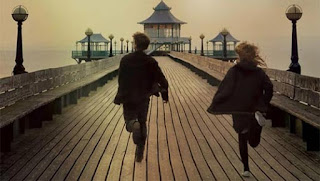TIFF 2010 Day 2: Jack Goes Boating; Curling; Never Let Me Go
 by Bill Chambers Friday began with Jack Goes Boating, the directorial debut of Philip Seymour Hoffman, who also stars as the title character. Jack is an airport limo driver who’s been the third wheel in the lives of his married friends Clyde (John Ortiz) and Lucy (Daphne Ruben-Vega) for so long that they’ve decided to intervene by setting him up with the mousy but receptive Connie (Amy Ryan). The movie, adapted–and, one suspects, significantly “opened up”–by Bob Glaudini from his own Off-Broadway play, casually parallels their burgeoning romance with the evaporation of Clyde and Lucy’s relationship. In a fall preview on his delightful blog, Nick Davis summed up his level of anticipation for Jack Goes Boating thusly: “Loved Synecdoche but can’t take much more schlub.” Truer words, etc. Jack isn’t just a schlub, he’s the ur-schlub, a maddeningly static individual who has to be nudged into action like a soccer ball, and Hoffman lights and poses himself to look as appetizing as Grimace from the Happy Meals. I much prefer another passion project of Hoffman’s, Love Liza: although it operates on the same demented frequency as Jack Goes Boating, there’s a whole slew of theatrical affectations to contend with this time around. (You can eventually set your watch to Jack’s nervous throat-clearing.) Ortiz is tremendously winning, though, in a bromantic role that reveals a lot more range, not to mention teeth, than Hollywood’s ever given him a chance to show. Jack Goes Boating reminded one woman I spoke to of Rocky; I can see it if I squint.
by Bill Chambers Friday began with Jack Goes Boating, the directorial debut of Philip Seymour Hoffman, who also stars as the title character. Jack is an airport limo driver who’s been the third wheel in the lives of his married friends Clyde (John Ortiz) and Lucy (Daphne Ruben-Vega) for so long that they’ve decided to intervene by setting him up with the mousy but receptive Connie (Amy Ryan). The movie, adapted–and, one suspects, significantly “opened up”–by Bob Glaudini from his own Off-Broadway play, casually parallels their burgeoning romance with the evaporation of Clyde and Lucy’s relationship. In a fall preview on his delightful blog, Nick Davis summed up his level of anticipation for Jack Goes Boating thusly: “Loved Synecdoche but can’t take much more schlub.” Truer words, etc. Jack isn’t just a schlub, he’s the ur-schlub, a maddeningly static individual who has to be nudged into action like a soccer ball, and Hoffman lights and poses himself to look as appetizing as Grimace from the Happy Meals. I much prefer another passion project of Hoffman’s, Love Liza: although it operates on the same demented frequency as Jack Goes Boating, there’s a whole slew of theatrical affectations to contend with this time around. (You can eventually set your watch to Jack’s nervous throat-clearing.) Ortiz is tremendously winning, though, in a bromantic role that reveals a lot more range, not to mention teeth, than Hollywood’s ever given him a chance to show. Jack Goes Boating reminded one woman I spoke to of Rocky; I can see it if I squint.
